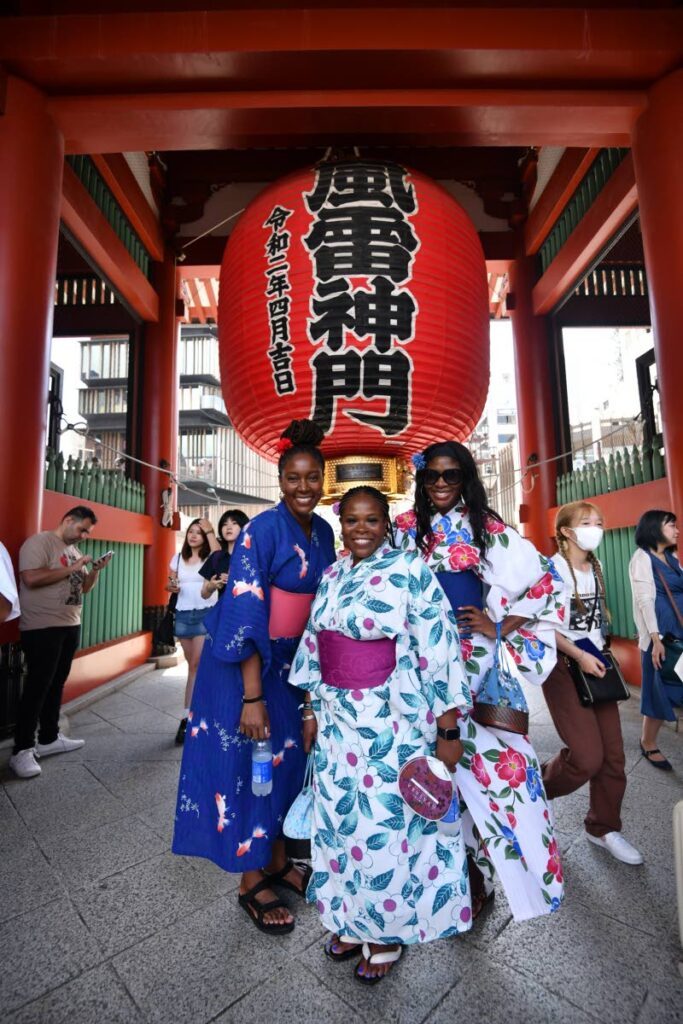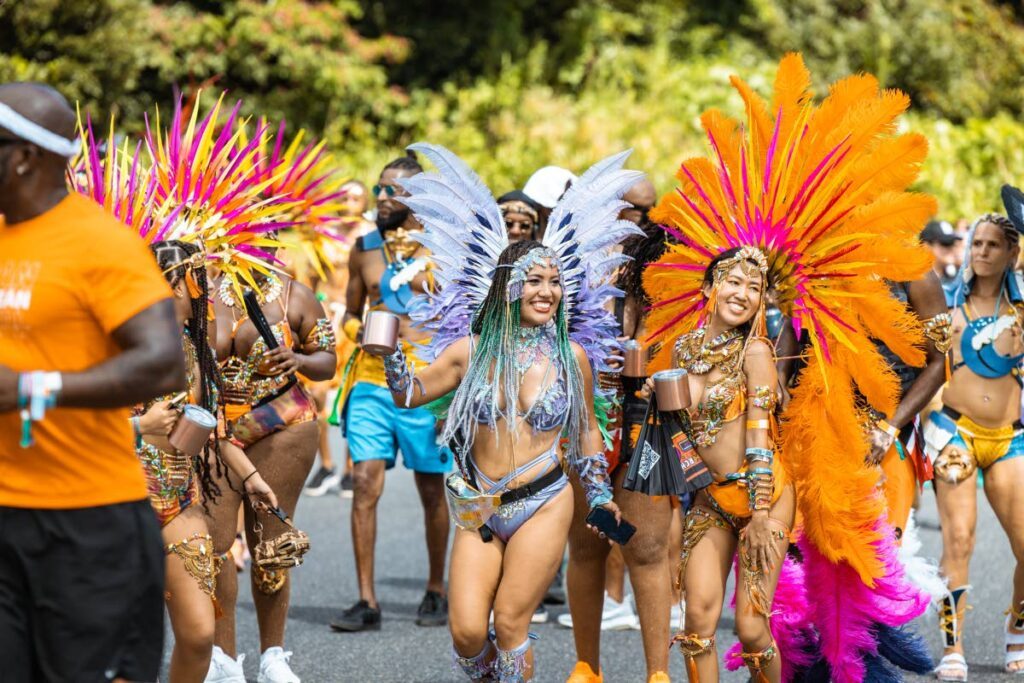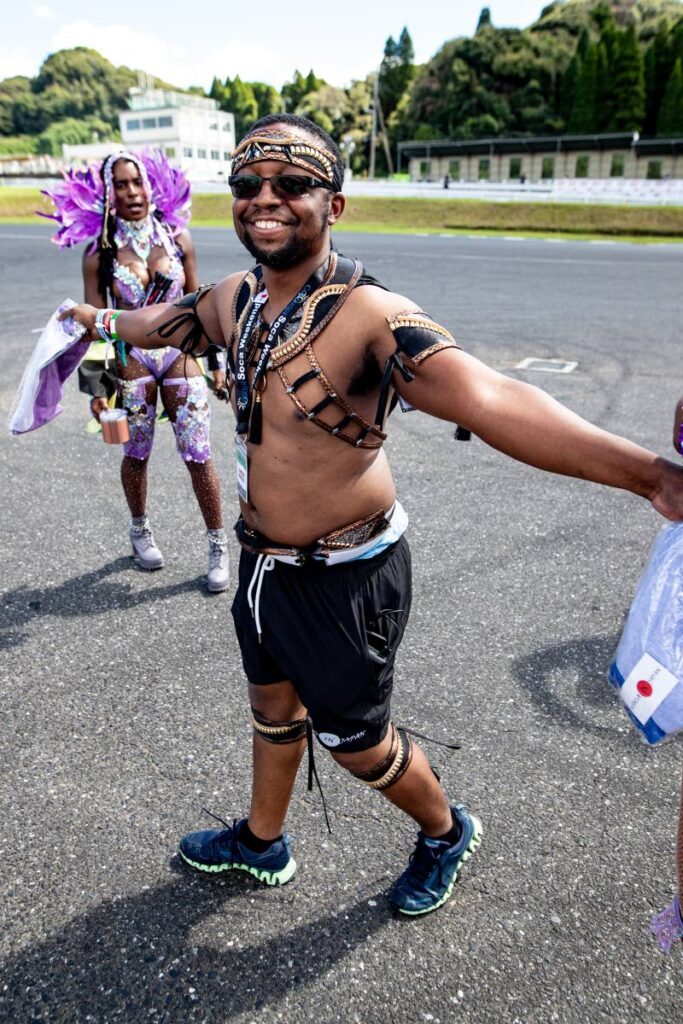The making of Japan Soca Weekend

RHIANNA MCKENZIE
Soca music and Trinidad and Tobago Carnival culture have been making waves internationally, even celebrating a few firsts in 2023.
On August 29, regional talent was celebrated at the inaugural Caribbean Music Awards at King’s Theatre, Brooklyn, New York, where local legend Machel Montano was presented with a Lifetime Achievement Award. On September 18, the annual Japan Soca Weekend (JSW) ended its five-day lineup of events with its inaugural TT-styled parade of the bands at the Moraba Twin Circuit race track in Chiba Prefecture, Japan.
With Caribbean communities all over the world, carnival and Caribbean festivals have been well-established, community-led events, drawing international attention to the region. Established in 1967, Toronto Canada’s Caribana Caribbean Festival is arguably North America’s largest Caribbean festival. London’s Notting Hill Carnival has also been a popular attraction in England, and Brooklyn’s Labour Day Parade dates all the way back to the 1930s in the US. TT's soca artistes have long travelled to other countries to make a living outside of the annual Carnival season.
So what’s the next big step in creating a cultural experience outside of the Caribbean? Carnival-hopping has been a luxurious hobby for enthusiasts for years, prompting promoters and regional tourism ministries to capitalise on their island’s particular brand of the festival. Even with TT's widely accepted as the mecca, Grenada’s Spice Mas, Jamaica’s Bacchanal Mas, Bahamas Junkanoo Carnival and other islands all bring their unique flavour to mas and have established carnival as a popular destination event.
Japan Soca Weekend (JSW) organiser Kegon Toussaint started the Soca in Japan company in 2017 after seeing the potential for it among both the Caribbean expat community and locals who had travelled to the islands and were familiar with the culture.
“I've always been a fan of Japanese culture, so when I met Japanese, including my wife, who are also fans of soca culture, it instantly came to me to create the best of both worlds. I shared my vision with my Japanese colleagues and the rest is history.”
Speaking to Sunday Newsday after the success of this year’s week of events, Toussaint broke down the evolution of the events in Japan.
“In terms of branding to the international community, everything is simply known as Soca in Japan. For the local community in Japan, they call it JSW or Soca Weekend. Additionally, there’s also the Soca in Japan tour, JSW edition which provides additional services such as sightseeing and exclusive events around the time of JSW.

“Lastly, Soca in Japan introduced Japan Caribbean Carnival for the first time this year. It is an extension of Japan Soca Weekend, but an evolution of the various mas-themed parties held during JSW over the years.”
Toussaint said in years past, there were mas-themed parties and boat rides around Tokyo harbour, but this summer was the first time those festivities moved to the road. The team offers two packages. The first package offers access to parties only. It caters to locals and members of the international community who feel comfortable travelling in Japan and want to attend the events independently. The second, a concierge package, offers tickets to all events, hotel accommodations, airport pickup, ground transportation to all events, and exclusive events not available with the regular party package.
“This is the most popular package for our international community and quickly sells out.”
This year’s schedule, which ran from September 13-18, included the Island Nations concert featuring performances from local soca stars Nailah Blackman, Mical Teja and Jadel. There was also a soca cosplay party, Soca Magic where attendees were serenaded by soca artistes dressed as their favourite anime characters. The Rum and Bass party in Shibuya, Tokyo celebrated its fifth year and patrons enjoyed a daytime J’Ouvert party with the grand finale, the parade, on September 18 where Blackman and other artistes also performed. All but Island Nations were sold out, including costumes. The group was also treated to tours of Tokyo and surrounding areas, including a traditional Sumo competition and a trip to Sensōji, also known as Asakusa Kannon Temple, one of Tokyo’s most popular Buddhist temples.
Supporting local talent
Soca in Japan offers yet another avenue for local artistes to ply their trade in another country. While Blackman had already performed in Japan in 2019, this was Mical Teja’s first time in the country.
“It has truly been amazing,” he said of the experience. Teja said he did not have the opportunity to do much sightseeing, but his trip was enough to be impressed by the country.
“The people are so respectful and the architecture has this harmonic blend of modern and traditional that I love.”
He said, having the opportunity to be in Japan to push the culture was a blessing.
“Trust me, I take none of this for granted, it being so early on in my career. It just shows the level of responsibility bestowed upon me to represent the culture in new territories.”
Teja said the energy from the crowd was fantastic.
“They truly love soca music and carnival culture. It’s something that’s growing, for sure. While I was performing I saw some of the locals actually singing the songs, word for word, and that feeling is priceless and I hold it as a magical moment in my career. I will definitely come back to Japan.”

Teja applauded Toussaint and his team for doing a great job of giving both locals and foreigners an authentic Carnival experience.
“From J’Ouvert to the parties, the truck on the road and the costumes as well. Soca and Carnival is on the rise in Japan and I believe in the coming years, it will be huge.”
He said the only difference between his experience in Japan and other islands is experience and numbers.
“The Caribbean has an industry built around carnival and tourism so a lot of the country’s resources goes into it. Japan is just getting started.”
He said people travelling to Japan for carnival is a beautiful thing.
“Yes, it may be costly depending on where you’re situated, but coming here to Japan has shown that there are so many Caribbean people living in Asia and nearby countries who long for this type of experience. I think from that standpoint, it’s worth it and I also think it’s a very good cultural exchange opportunity and you can’t put a price on that.”
Trinidadian national Apphia Pereira, who lives in Japan, was a part of the JSW team as one of its costume designers. Pereira was one of two designers on the team. This year’s costumes were inspired by Japanese Gods and Pereira quickly got to work on learning as much as she could to combine the theme with Caribbean flavour.
“I had a particular colour scheme in mind (and) after doing a lot of research I started conceptualising a fusion of elements from the lore and traditional carnival elements. A lot of research went into the history and cultural impact.”
Pereira said she stayed true to the spirit of carnival in her design, adding that the other Japanese designer has experience working for other countries during carnival, and was also able to stay true to the culture.
The future of carnival in Japan
Toussaint said he believes Caribbean culture is popular in Japan as locals are attracted to the freedom and openness of the music and the people.
“There’s no judgment at a soca event. People just show up and be themselves. Just take in the music and enjoy life.”
He said while Trinidad will always be the mecca, Japan still has something unique to offer.
“There’s no comparison in terms of scale and just being able to see all the artistes and even experiencing the dirtiest and wettest of J’Ouvert (but) when you come to JSW it’s an intimate experience. You become like family. You get that up-close experience with the artistes and DJs. Over 50 per cent of our international customers are returning or referrals.
"For 2024, many have expressed that they plan to bring large groups and even went as far as requesting that we open up registration to previous customers first.”
Toussaint said this year saw a diverse group of just over 200 participants representing TT, the US, Cuba, Japan, Jamaica and the Virgin Islands.
“I can’t say the exact amount from each country but there was quite a decent amount of representation directly from the Caribbean.”

Of the American participants, many were of Caribbean descent with parents from Haiti and Barbados.
Despite what Toussaint and his team consider the resounding success of the weekend, pulling it off was not exactly smooth sailing. He said there were hurdles to jump, including cultural and language barriers.
“We are the only known J’Ouvert in the world that requires our patrons to shower after the event,” he joked.
“It goes without saying that no taxi or transportation service would ever allow a dirty patron to board in Japan, as Japan is renowned for its cleanliness.
“Japan Caribbean Carnival is about 80 minutes outside the city of Tokyo because finding a suitable area in Tokyo to host such an event with loud music is near impossible.”
Toussaint said not knowing the language has also been a challenge.
“I do not speak Japanese, and many members of my team do not speak fluent English so frequently we have miscommunication leading to frustration by the team. Eventually, this is resolved, but valuable time can be lost as a result.”
He also cited infrastructural issues.
“Since most people in Japan live in tiny apartments and heavily rely on public transportation, moving event materials around can be quite difficult. This year we heavily relied on the storage compartment of our tour buses to move materials to various venues.”
Despite it being a costly trip, Toussaint said based on the feedback he received from participants, it has been a worthwhile experience.
“Absolutely, it is a very costly trip flying from Trinidad. But, speaking (participants) will tell you it’s worth it if you can afford it.”
He said what makes the experience unique is the cross-cultural experience.
“They are two opposing cultures but they complement each other in unique ways. The Japanese want to be free (and many) Trinis want to experience Japanese tradition. Speaking to one of our customers who came directly from Trinidad, I can’t tell you how many times she praised us. She absolutely loved it.”
The JSW website, estimated early bird weekend pass prices for its events started at US$300, costumes were an estimated $450, the full tour package started at $1,650 per person and includes the weekend pass, sightseeing, ground transportation, bilingual staff and hotel accommodations. The full tour package, however, does not include airfare or a costume.
Despite the challenges, Toussaint said his team all enjoyed working together, especially the locals, and collaborations with Japanese vendors was a positive experience.
“To be honest, they all love what we’re doing. For the most part they’re fans of Caribbean music so when they see the scale of our events and the number of Caribbean people in attendance they welcome it with open arms. They’re getting an authentic Caribbean experience right here in Japan.
“There are some vendors that weren’t familiar with Caribbean culture, but after attending our events they instantly fall in love. Many of them are already volunteering to help out next year. Imagine our (older) bus driver asking for a soca mixtape,” he said with a laugh.
Overall, Toussaint said soca is here to stay in Japan and believes it will continue to grow.
"Soca is happy and positive music. It’s a festival of music which Japanese love. Japan is known for matsuri (festivals) and soca music is one of the best genres of music to capitalise on this.”
Toussaint said he was overwhelmed by the response to this year’s events.
“I just want to thank everyone for coming out and supporting our festival. Many people might know me by now being the founder of Soca in Japan, but trust and believe I could not do this without my team. We are a team of Japanese and Caribbean expats making history in Japan.”
He said although the festival has been limited to the Kanto region of Japan (Tokyo/Chiba prefectures), he foresees it growing in popularity throughout the country. “We are passionate about soca music and the culture that surrounds it. We are happy to see so many positive people coming and enjoying our festival. Many of you have now become like family to us. Our team will be working hard so we can see you all feteing with us once again for 2024.”

Comments
"The making of Japan Soca Weekend"